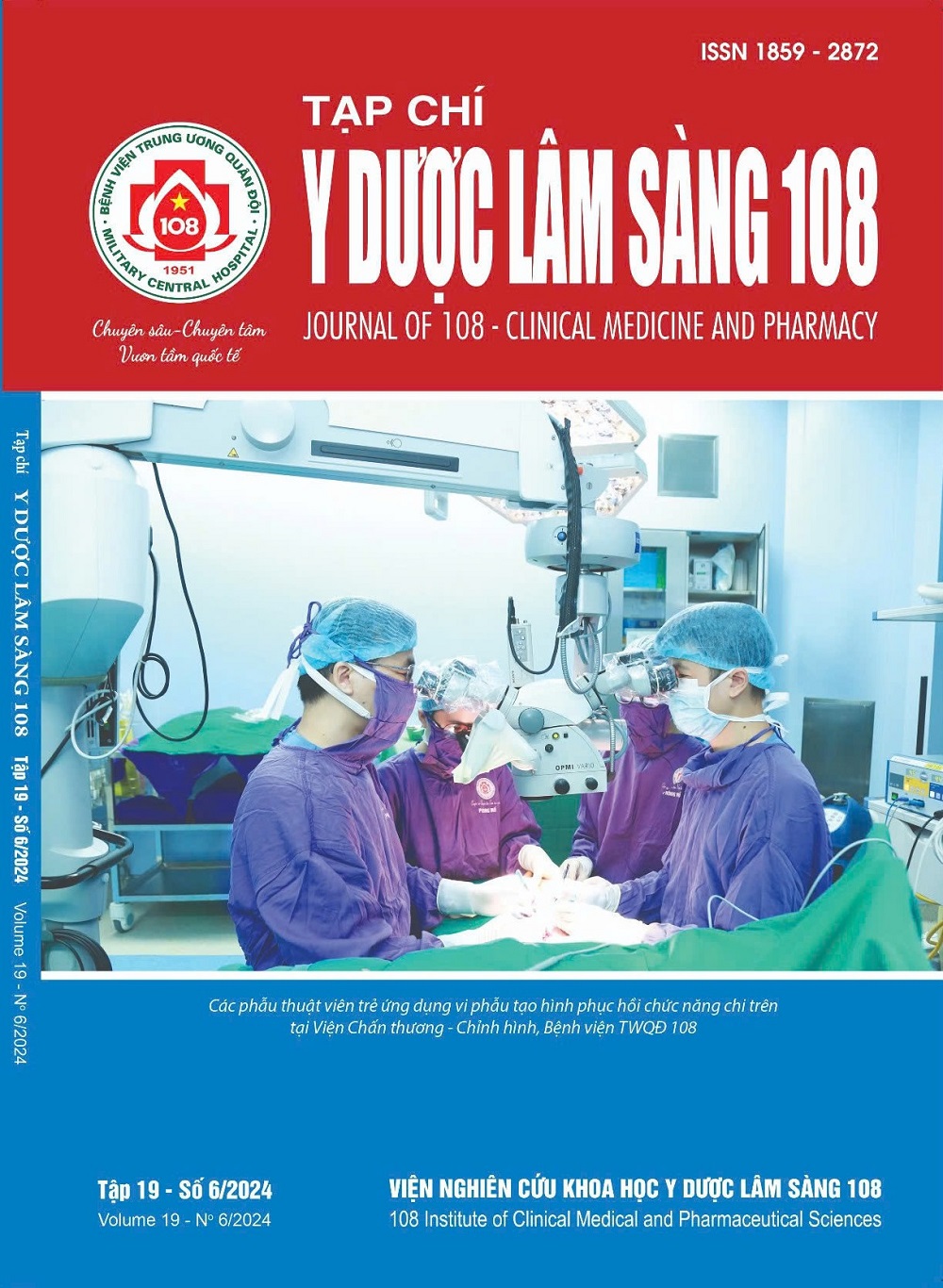Treatment outcomes of total neoadjuvant therapy on stage II, III rectal cancer patients at 108 Military Central Hospital
Main Article Content
Keywords
Abstract
Objective: To evaluate the pathological Complete Response (pCR) results of patients with stage II and III rectal cancer treated with total neoadjuvant therapy (TNT) and several associated factors on these patients. Subject and method: This intervention study without control group on 51 patients with stage II and III rectal cancer who received radiation therapy with total dose of 50.4Gy in combination with capecitabine at the dose of 835mg/m2 ´ 2 times/day ´ 28 radiothrapy days, then underwent 12-16 weeks of neoadjuvant chemotherapy. Radical surgery with total mesorectal excision was performed at 2-4 weeks later. To evaluate pCR base on tumor regression. Result: In the study, there was 98% (50/51 patients) responded on pathology, in which the pCR rate was 33.3%. There was only 1 patient had progressive disease after treatment accounting for 2%. Several factors associated with pCR included: tumor length, N stage, age group, and clinical response. The tumor length smaller than 4cm had a higher pCR rate at 60% compared to those > 4cm. N0, N1, N2 stages had pCR rate of 100%, 60%, 25%, respectively (p=0.012). Patients from 65 years old had a higher pCR rate (52.9%) compared to those under 65, pCR 23.5%, p=0.036. Patients who achieved cCR (complete clinical response) had a higher pCR rate than who achieved non-cCR (62.5% vs 20%, p=0.003). Conclusion: Total neoadjuvant therapy before surgery resulted in high rates of the pathological complete response. Patients with a small tumor length, stage N0-1, elder age have better chance of achieving pCR compared to the other groups with larger tumor, stage2, younger age. Patients achieving cCR had a higher rate of pCR.
Article Details
References
2. Conroy T, Lamfichekh N, Etienne P, Rio E, François E, Mesgouez-Nebout N, Vendrely V, Artignan X, Bouché O, Gargot D, Boige V, Bonichon-Lamichhane N, Louvet C, Morand C, Fouchardière CD, Juzyna B, Rullier E, Marchal F, Castan F & Borg C (2020) Total neoadjuvant therapy with mFOLFIRINOX versus preoperative chemoradiation in patients with locally advanced rectal cancer: Final results of PRODIGE 23 phase III trial, a UNICANCER GI trial. Journal of Clinical Oncology.
3. Hospers G, Bahadoer RR, Dijkstra EA, et al (2020) Short-course radiotherapy followed by chemotherapy before TME in locally advanced rectal cancer: The randomized RAPIDO trial. J Clin Oncol 38(15):4006-4006. doi:10.1200/JCO.2020.38.15_suppl.4006.
4. Smith JJ, Chow OS, Gollub MJ et al (2015) Organ Preservation in Rectal Adenocarcinoma: A phase II randomized controlled trial evaluating 3-year disease-free survival in patients with locally advanced rectal cancer treated with chemoradiation plus induction or consolidation chemotherapy, and total mesorectal excision or nonoperative management. BMC Cancer 15: 767. doi:10.1186/s12885-015-1632-z.
5. Gavioli M, Luppi G, Losi L et al (2005) Incidence and clinical impact of sterilized disease and minimal residual disease after preoperative radiochemotherapy for rectal cancer. Dis Colon Rectum 48(10): 1851-1857. doi:10.1007/s10350-005-0133-6.
6. Phạm Cẩm Phương (2013) Đánh giá hiệu quả của xạ trị kết hợp Capecitabine trước mổ trong ung thư trực tràng thấp tiến triển tại chỗ. Luận án Tiến sỹ, Đại học Y Hà Nội.
7. Nguyễn Văn Hiếu, Lê Văn Quảng, Bùi Công Toàn (2023) Đánh giá kết quả hóa xạ trị tiền phẫu trong ung thư trực tràng giai đoạn xâm lấn. Bản B Của Tạp Chí Khoa Học Và Công Nghệ Việt Nam 60(2). Accessed. https://b.vjst.vn/index.php/ban_b/article/view/272.
8. Chapman BC, Lai SH, Friedrich T et al (2023) Rectal cancer: Clinical and molecular predictors of a complete response to total neoadjuvant therapy. Dis Colon Rectum 66(4): 521-530. doi:10.1097/DCR.0000000000002245.
9. Nguyễn Thị Hà, Nguyễn Xuân Kiên, Nguyễn Đình Châu và cộng sự (2023) Kết quả bước đầu của điều trị tân bổ trợ toàn diện trước phẫu thuật ở bệnh nhân ung thư trực tràng giai đoạn II, III tại Bệnh viện Trung ương Quân đội 108. Tạp chí Y Dược lâm sàng 108. doi:10.52389/ydls.v18i0.1773.
10. Perez K, Safran H, Sikov W et al (2017) Complete Neoadjuvant Treatment for Rectal Cancer: The Brown University Oncology Group CONTRE Study. Am J Clin Oncol 40(3):283-287. doi:10.1097/COC.0000000000000149.
11. Garcia-Aguilar J, Chow OS, Smith DD et al (2015) Effect of adding mFOLFOX6 after neoadjuvant chemoradiation in locally advanced rectal cancer: a multicentre, phase 2 trial. Lancet Oncol16(8):957-966. doi:10.1016/S1470-2045(15)00004-2.
12. Zhang H, Cao K, Li G et al (2022) Active surveillance in long period of total neoadjuvant therapy in rectal cancer: Early prediction of poor regression response. Front Oncol 12: 1049228. doi:10.3389/fonc.2022.1049228.
13. Mehraj A, Baba AA, Khan B et al (2022) Predictors of pathological complete response following neoadjuvant chemoradiotherapy for rectal cancer. J Cancer Res Ther 18(Supplement):391-396. doi:10.4103/jcrt.JCRT_1273_20
 ISSN: 1859 - 2872
ISSN: 1859 - 2872
